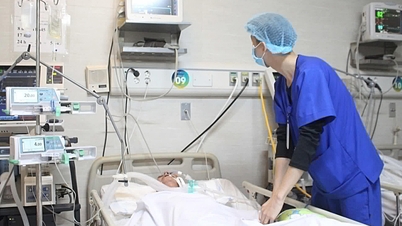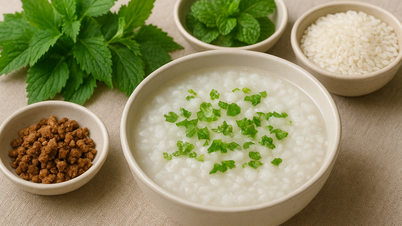Sore throat is a common infection that often occurs during the changing seasons. This is the ideal time for viruses and bacteria to grow and attack the respiratory tract, causing sore throat.
Usually, sore throat will heal itself after about 1 week and does not leave any dangerous complications for health. However, sometimes, there are still some cases where the disease can recur many times and lead to complications of prolonged sore throat, affecting the quality of life.

Illustration photo
4 causes of prolonged sore throat
Patients are subjective with mild symptoms of cough, sore throat, and swelling, combined with a weak body, easily affected by the weather, and having a respiratory disease... causing the disease to become severe and develop into prolonged pharyngitis;
Sore throat due to habit of coughing and spitting
This habit causes the capillaries in the patient's throat to stretch, rupture and lead to severe damage to the throat mucosa, creating an opportunity for bacteria to invade and cause prolonged, recurring pharyngitis.
Sore throat due to weak resistance
If the patient often has prolonged sore throat, it may be due to a weak immune system, making them susceptible to viruses and bacteria attacks. In this case, they should actively strengthen their resistance to limit pathogens.
Sore throat due to gastric reflux
Sore throat and gastric reflux are also factors that cause the condition to persist without improvement. In this case, the most effective solution is to take medication to control gastric reflux in parallel with the medication to treat sore throat;
Sore throat due to sinusitis, allergic rhinitis
People with sinusitis and allergic rhinitis are also likely to have persistent, recurring sore throats.
When should I see a doctor for a persistent sore throat?

Illustration photo
When suffering from pharyngitis, the patient will feel uncomfortable when the throat is always sore, difficult to swallow and always want to spit. In addition, the disease can cause a number of other symptoms such as: sore throat; fever, muscle and joint pain; headache; skin rash; swollen lymph nodes in the neck.
In case of sore throat due to reflux, the patient may also experience some symptoms such as coughing, sneezing, fever above 38 degrees Celsius and mild headache.
Although sore throat is not life-threatening, if it lasts for a long time, it can affect daily activities and cause discomfort. Therefore, patients should go to reputable medical facilities for examination, determine the cause and come up with a definitive treatment plan.
What to do to prevent prolonged sore throat
To effectively treat chronic pharyngitis, in addition to taking medication as directed by your doctor, you also need to apply the following preventive measures:
- Must clean mouth, nose, throat every day.
- Limit exposure to things that can damage the throat lining such as dust, ice, alcohol, etc.
- If you use air conditioning, don't set the temperature too low. You must keep your body warm in winter.
- Limit spicy foods, drink plenty of water, eat nutritious, soft foods.
- Thoroughly treat diseases related to the stomach and respiratory tract such as ear infections, sinusitis, stomatitis... to avoid fluids containing bacteria, viruses, and fungi from flowing down, causing the patient to have prolonged sore throat.
- When the disease occurs, timely treatment is needed, however, antibiotics should not be overused because it will increase the risk of recurrence.
Source



![[Photo] Prime Minister Pham Minh Chinh chairs meeting to deploy overcoming consequences of storm No. 10](https://vphoto.vietnam.vn/thumb/1200x675/vietnam/resource/IMAGE/2025/10/3/544f420dcc844463898fcbef46247d16)
![[Photo] Students of Binh Minh Primary School enjoy the full moon festival, receiving the joys of childhood](https://vphoto.vietnam.vn/thumb/1200x675/vietnam/resource/IMAGE/2025/10/3/8cf8abef22fe4471be400a818912cb85)





































































































Comment (0)